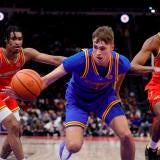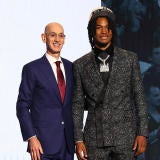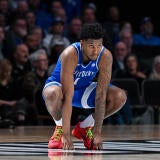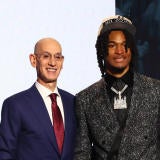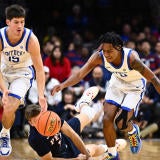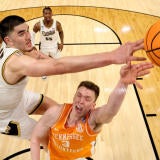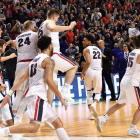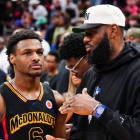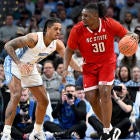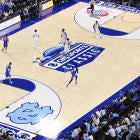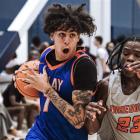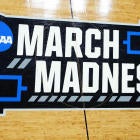This is not the most appealing Final Four, but that doesn’t make it short on plot lines and talking points, helped in good part by the fact it’s new blood vs. blue blood.
South Carolina will face Gonzaga, making this the first Final Four in 21 years with two programs making their debuts. And Gonzaga-South Carolina marks the first time since 1973 (Memphis State vs. Providence) that two schools making their debuts will square off in the national semifinals. Crazy that it’s been that long.
Also, 1973 was the last time South Carolina won an NCAA Tournament game. But what will be the talk of Phoenix? Below, for better or worse, here are the 10 most compelling storylines of the Final Four -- a cheat sheet to help your prep.
1. North Carolina’s redemption tour
A year after losing the final as the final buzzer sounded, the Tar Heels are back in Final Four by doing to Kentucky what Villanova did to them. This is already a played-out story (they have a group-text chat named “Redemption”!), but get prepared for a lot more of it, especially if UNC makes it to Monday night. If you’re wondering how often a team that lost in the title game came back to win the tournament the next season, it’s happened three times and all by blue bloods: UNC lost the 1981 title game to Indiana, 63-50, and beat Georgetown (63-62; you may remember the Michael Jordan jumper to seal victory); Duke lost 103-93 to UNLV in 1990, then beat Kansas 72-65 in 1997, Kentucky was knocked off 84-79 by Arizona in overtime, then beat Utah 78-69 in 1998.
2. Frank Martin’s road to making South Carolina a Final Four team
If you want the background on Martin, I touched on a lot of it here. He could be the most discussed aspect of the Final Four by Saturday evening. He’s mellowed over the years, he’s loyal, but he still looks like he’ll pop a vain during games from time to time. Because the tone of Martin’s voice is so commanding and because he’s such a character, he’ll be a media darling. He’ll probably have a memorable press conference quote or two as well. Martin’s image has evolved since he got to South Carolina; you’ll read plenty about that, too.
Sidebar/bonus story/2a: South Carolina’s women’s team has made the Final Four. So it’s a huge week for that university. Syracuse achieved it last season. Texas, LSU, Louisville, UConn (four times) Oklahoma, Duke, Michigan State and Georgia also have pulled this off. Not as rare as you might think!
3. Gonzaga’s run at history
Mark Few taking Gonzaga to the Final Four would be a watershed moment had we not seen George Mason, Butler, VCU and Wichita State make the Final Four in the previous 11 years. That shouldn’t take away from Gonzaga’s moment, but perhaps this arrival comes with less awe and more relief, if that makes sense. Either way, Gonzaga breaking through its ceiling will make for a better time in Phoenix. The program moved beyond mid-major status about a decade ago, and this could be the first of multiple Final Four trips for Few. As we get closer to Saturday, the conversation will move away from Gonzaga’s presence here to the rightful discussion of a Gonzaga as the favorite. Let’s focus on that. Of course, Gonzaga facing an 11 seed in the Elite Eight and a 7 seed in the Final Four will be harped upon. But that’s dumb.
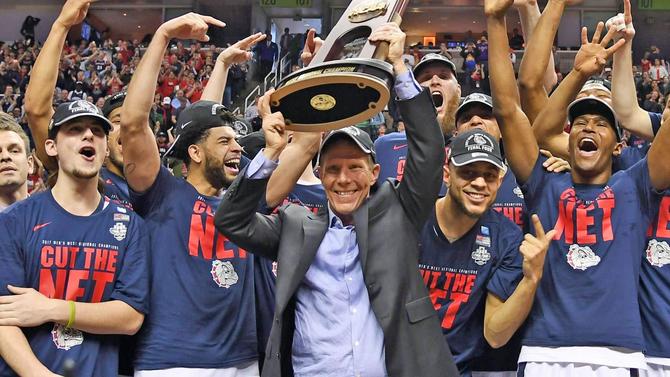
4. Seventy-eight years later, Oregon goes for another national title
The “wandering Webfoots” of 1939 won the first NCAA Tournament. So, of course, this is the longest gap between national semifinal appearances. Texas now owns the longest gap between Final Four showings (56 years, 1947-2003). You’ll be sure to see the black-and-white photos and tales from the years gone by, like how Oregon had to travel by train and it took them three weeks or something to get from Eugene to Evanston back in ’39. What this has to do with the current Final Four? Not a thing. But Oregon did win the first tournament, so we’ll get a nostalgic look back.
5. UNC’s wait with the NCAA
Another well-chronicled story will be resurrected in the coming days. The NCAA is still investigating academic fraud and its effects within North Carolina athletic department, a case that has dragged on more than five years and is one of the longest in NCAA history. For a timeline of UNC’s issues with academic fraud -- allegations that date back to the Dean Smith era -- read here, and prepare for more. Roy Williams will be asked about this by Thursday, and NCAA President Mark Emmert also will have to touch on this. What’s to be determined: Will UNC lose a 2005 or 2009 banner because players on either team illegally earned passing grades in phony courses?
6. The West Coast’s return
This Final Four is the first in nine years to feature a team from the Pacific time zone. It’s the first time ever that two teams from Pacific time zone have made the national semifinals. How wild is that? The Pacific Northwest slant to this is fun, too. Lotta granola, lotta marijuana jokes to come. Also, per the NCAA, this is only the sixth time we’ve had two teams in the Final Four west of the Central time zone. It’s a fitting coincidence that this happens in the same year that the Final Four has its first hosting duty in the West since 1995, when Seattle hosted. That year, a team from the West Coast (UCLA) won the title. Will history repeat? This is Arizona’s first time hosting a Final Four, by the way.
7. Dana Altman’s shaky handling of Oregon’s rape case
I’d be surprised if Altman is not asked about this. We are not even three years removed from many people calling for Oregon to fire Altman. In 2014, three of his players were accused of sexual assault. Two played in the NCAA Tournament prior to that information becoming public. Altman later claimed he didn’t know the specifics, so he didn’t take action. A police report detailed the case, though former Ducks Dominic Artis, Damyean Dotson and Brandon Austin were not prosecuted because of a lack of evidence. Oregon president Michael Gottfredson later banned the players from campus and AD Rob Mullens said “it was very clear to us that those were individuals we didn’t want representing our organization.”
Altman kept his job, and now Oregon’s is in the Final Four. It doesn’t make for such a happy story, does it? We can at the same time continue to hold Altman accountable but also give the current Oregon players credit and publicity for their accomplishments.

8. No one-and-dones here
It’s not unprecedented, but you’ll like hear about how this Final Four lacks a one-and-done player (UNC’s Tony Bradley, who has no business declaring for the draft, is the closest). No, this isn’t a commentary on veteran teams being more reliable than stud freshmen. Duke in 2015, Louisville in 2013 and Kentucky in 2012 are recent examples of teams that won a title largely because of critical freshmen contributions. But it is interesting. I’d guess the 2018 Final Four will feature at least one team with a first-year player who will be a no-brainer, off-to-the-draft situation.
9. Dylan Ennis’ Villanova redemption
Dylan Ennis is the grampy of college basketball. Now at 25, he’s almost literally a man among boys. You’ll likely come across a story or two of Ennis’ travels from Rice to Villanova to Oregon, but the particularly interesting angle here is that Ennis opted to leave Villanova when he was earning good minutes. So he heads to Oregon, then gets injured and misses out on the 2015-16 season. From afar, he watches his former teammates win the title. Now he has a chance to get his. Kinda cool, right?
10. Roy Williams being underrated as an all-time coach
This story ends forever if Roy wins his third national title. He’d join John Wooden, Mike Krzyzewski, Adolph Rupp, Bob Knight and Jim Calhoun as the only coaches with at least three national titles. Williams has made nine Final Fours; only Wooden (12), Coach K (12) and Dean Smith (11) have more. The guy has been a top-tier coach for almost 25 years. It’s stupid to think about, but it’s probably true: In order for Williams’ name to consistently, and forever, be associated with the game’s very best, he’ll need to win three titles. Shouldn’t be that way, but you hear John Caliper’s name dropped among the best current coaches in college more often than you do Roy’s, and Roy has twice the titles Cal has.


